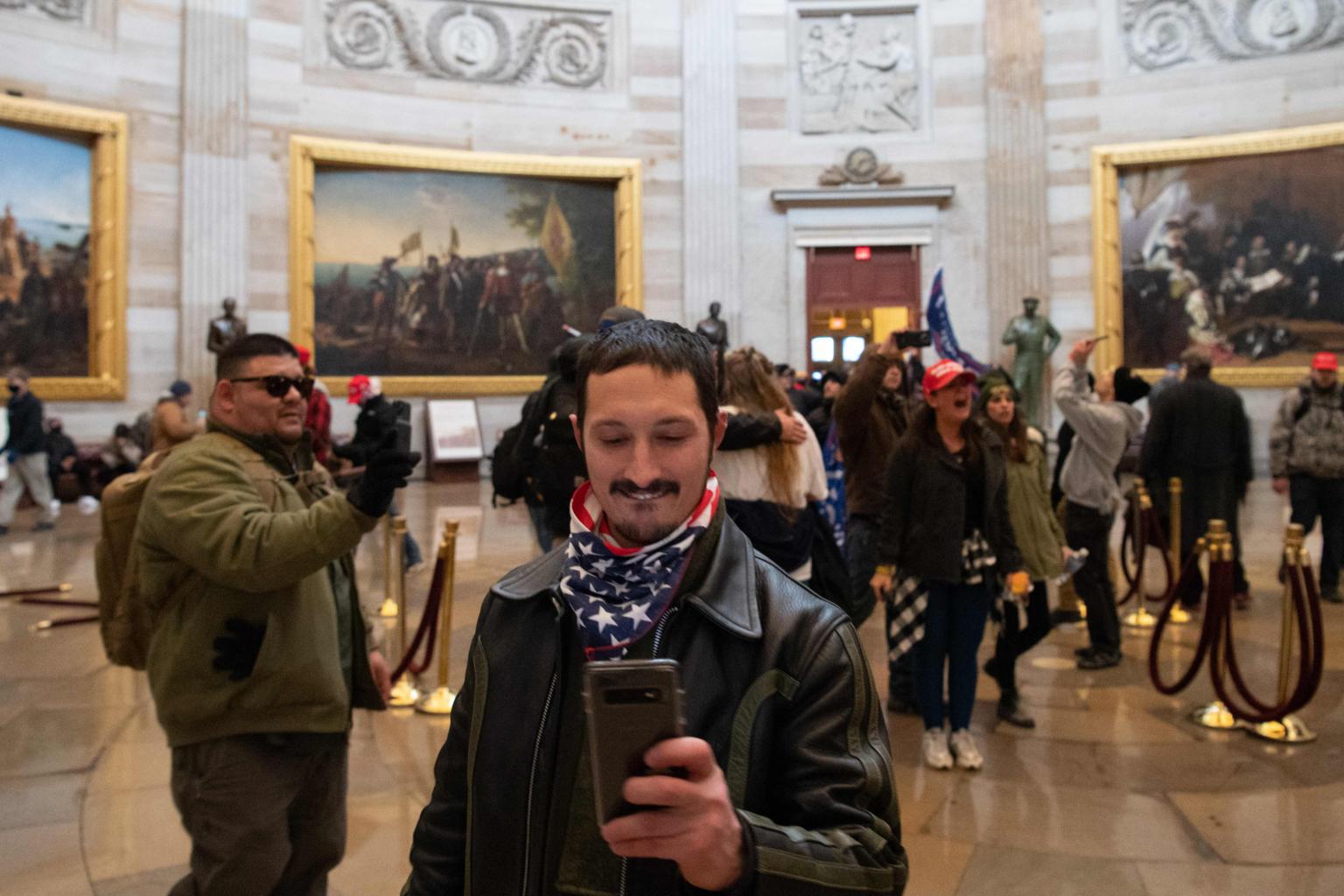US Capitol riot: How social media helped enable attack by die-hard Trump fans
Sign up now: Get ST's newsletters delivered to your inbox

Supporters of US President Donald Trump are seen in the Rotunda of the US Capitol in Washington on Jan 6, 2021.
PHOTO: AFP
Follow topic:
WASHINGTON - "If we occupy the Capitol building, there will be no vote," one user on the pro-Trump forum The Donald wrote on Tuesday (Jan 5), a day before hundreds of extremists stormed the Capitol to attempt exactly that.
"GOTTA OVERWHELM THOSE BARRICADES AND COPS," another user replied. Others chimed in on the discussion, suggesting that they could enter using side doors for visitors or infiltrate the tunnels beneath the Capitol, which they had researched the street entrances to.
Such discussions of violence took place across pro-Trump groups on Facebook, messaging service Telegram, Instagram and on Trump-friendly social media platforms such as Parler and The Donald, in the lead-up to Wednesday, a self-styled day of reckoning for die-hard Trump fans to "stop the steal".
By halting Congress' session to count and announce the electoral vote tally certified by states, they could stop Congress from certifying President-elect Joe Biden's win and keep President Donald Trump in the White House, they reasoned.
Experts said that the use of these groups highlights the challenge of containing extremism online, in an unregulated media ecosystem fuelled by disinformation from malign actors and even political leaders.
Mr Trump's die-hard supporters publicly floated some of the exact tactics used to storm the Capitol on Wednesday, in comments that frequently included threats to lawmakers and sentiments of self-martyrdom.
"If it came down to it, I wouldn't think twice about dying just so my family and friends can live free," said one The Donald user four days ago.
Another replied that "corrupt politicians" "need to hang for their treason", writing: "Bring the wood, build the gallows outside Congress, be mentally prepared to pull them out and string em up."
"In recent weeks, extremists repeatedly stated their desire for chaos and destruction at Jan 6 protests in Washington," said Mr Jared Holt, a visiting research fellow at the Atlantic Council think-tank's disinformation studies centre, the Digital Forensic Research Lab (DFRLab).
Several communities monitored by the DFRLab had discussed the use of overwhelming crowds to violate laws and enter the Capitol, Mr Holt said on Thursday.
"While extremists on the ground live-streamed and bragged about the chaos they created minute-to-minute, far-right online communities aggregated their content and cheered on their efforts," said Mr Holt, adding that some platforms glitched owing to overwhelming traffic.
DFRLab director Graham Brookie noted that when Parler and The Donald briefly went down, netizens adjusted and started posting their content on other sites.
"The migration reiterates that the challenge of online extremism is not limited to any one platform, but rather, an entire, largely unregulated ecosystem with very few barriers to engage or disseminate content," said Mr Brookie.

This largely unregulated ecosystem thus far has kept conspiracies alive and enabled extremists to be radicalised.
But the DFRLab researchers said that these smaller alternative platforms would likely come under more scrutiny from regulators and public officials, who have already trained the spotlight on social media giants in Congressional hearings in recent months.
"Congressional hearings we've seen with large social media platforms are fast coming for smaller platforms used by extremists," said Mr Brookie.
"This is a cross-cutting issue that touches on homeland security, tech regulation, media standards and many others, and it has come to a head," he added.
But the issue goes beyond social media to the entire industry of fake news, said researchers, who also blame politicians for adding fuel to the fire by directly spreading disinformation.
"It's far more than just a social media problem. It's a problem with our actual elected officials being direct disseminators of disinformation. And our traditional news outlets - our cable outlets, Fox News, for example, amplifying blatant disinformation," said Duke University public policy professor Phil Napoli, who researches social media regulation.
Florida congressman and staunch Trump ally Matt Gaetz, for instance, said in Congress on Thursday: "Some of the people who breached the Capitol today were not Trump supporters. They were masquerading as Trump supporters and in fact, were members of the violent terrorist group antifa."
His source: An article by The Washington Times conservative newspaper claimed the facial recognition company XRVision identified some rioters as part of the anti-fascist movement. XRVision said the article was false, and it has since been taken down.
The effect of the suspension of Mr Trump's Facebook account, at least until the end of his term, also remains to be seen. Twitter and Facebook have been the President's megaphone throughout his term, but both companies have said that he will not be able to use their platforms if he continues to break the rules.
Experts have said they are likely to be less lenient on Mr Trump once he is out of the White House. But if he turns to Parler and other smaller platforms, he may deepen his support among his loyal fans, at the cost of losing the reach and online clout that Facebook and Twitter granted him.
One thing is clear: Jan 6 was a day that drove the devastating, real-world effects of disinformation home.
"People were evacuated, held hostage, and experienced violence over disinformation and misinformation," Ms Lisa Kaplan, the founder of the Alethea Group which tracks disinformation, wrote on Twitter. "Let that sink in."

